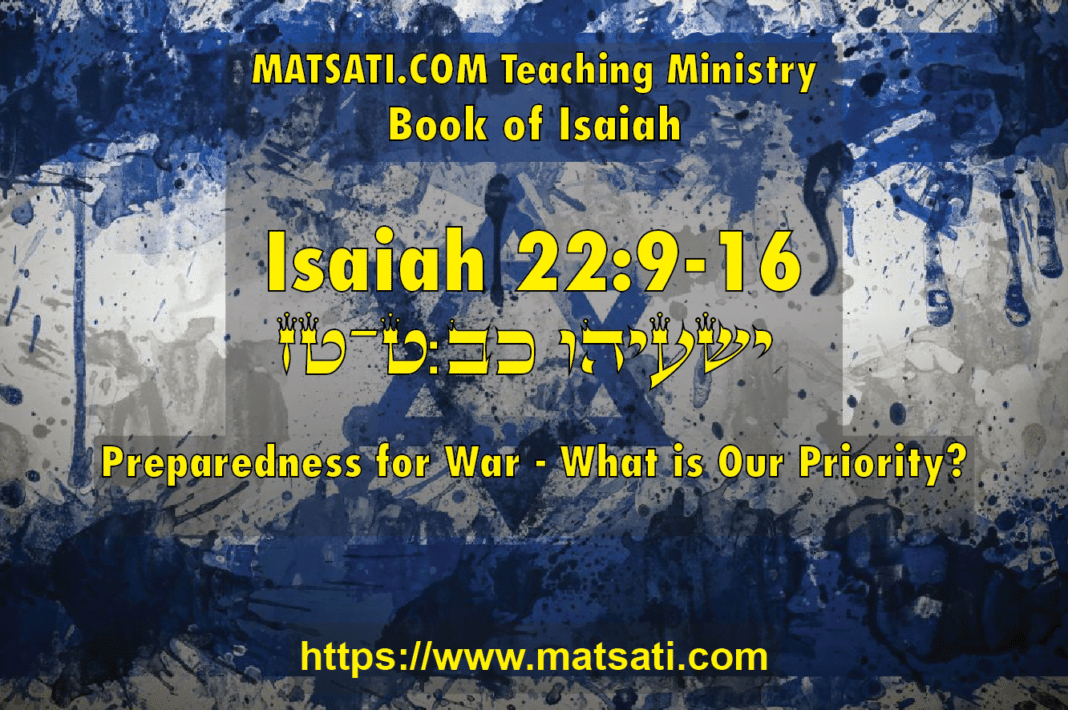Isaiah 22:9-16
The prophet Isaiah speaks on the weapons of war (Isaiah 22:8), the walls (22:9-10), and the supply of water (22:9-11). The preparedness for war is not the problem here, the major problem is Judah and Jerusalem not trusting in the Lord, making Him their priority as opposed to relying upon themselves. We are called all throughout history to pay attention to our Maker, to the Creator God, the Author of Life, and seek His holy and righteous ways. The people were stagnant in their faith. This idea of spiritual stagnation makes me think back to Chemical Engineering and Transport Phenomenon with fluid flow over a surface, concentration profiles and diffusion, reaction engineering, etc. In one-dimensional diffusion to a catalyst surface, a reactant or chemical must diffuse through a layer of stagnant fluid in order to react at the catalyst surface. This can be a lengthy process, depending upon the properties of the reactants and the boundary layer film. Take for example, if the reactants are polar molecules, and the stagnant layer is a hydrocarbon fluid, diffusion of the reactant may never take place since the hydrocarbon film resists diffusion of polar molecules. The point is in relation to this idea of the stagnant film, the rejection of God’s word leads to something very similar to this boundary layer diffusion theory, where turning from God’s word there will result in zero spiritual growth. Take for example, one of the most powerful ways to grow spiritually is to raise our values to a higher standard and translate those higher values into action in all that we do. How do we do this, raising our values? The way to do this is to understand what our current values are and then compare them to what God has said our values should be according to the Scriptures. When times are easy, we will see the truth about who we are, our values, and our actions will demonstrate the kind of people we are. On the other hand, when times are tough, this generally pushes one to seek the Lord. If our Father God in heaven is sovereign over all, then our first task should be to seek Him in the moment of crisis. This is the kind of people we are called to be, a people who trust in the Lord and seek Him first. This ultimately is the issue that Isaiah is speaking of concerning Judah and Jerusalem, they need to seek their Maker, not their weapons of war.
Isaiah continues saying the following according to Isaiah 22:9.
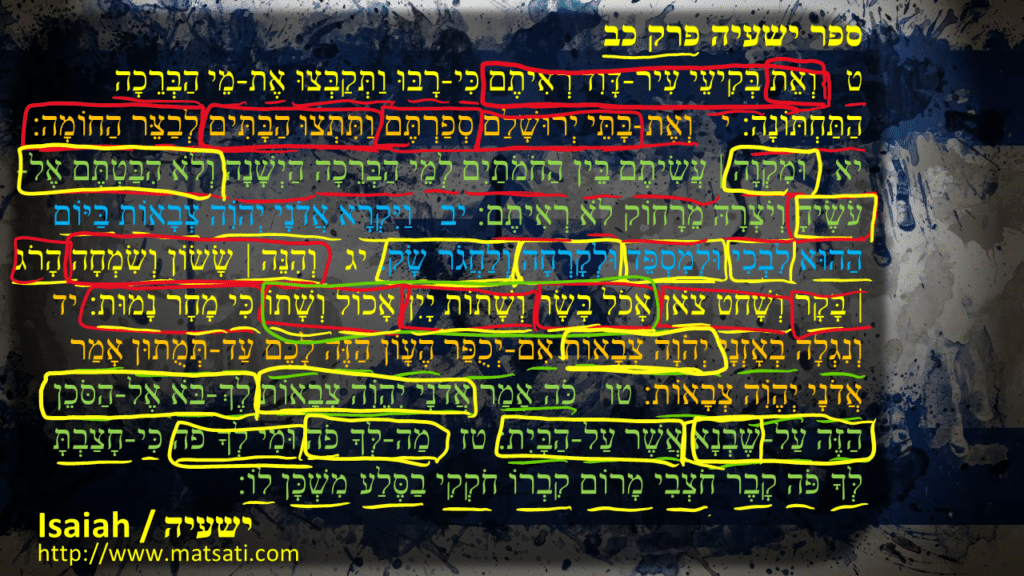
ספר ישעיה פרק כב
ט וְאֵת בְּקִיעֵי עִיר-דָּוִד רְאִיתֶם כִּי-רָבּוּ וַתְּקַבְּצוּ אֶת-מֵי הַבְּרֵכָה הַתַּחְתּוֹנָה:
Isaiah 22:9 states, “Ye have seen also the breaches of the city of David, (וְאֵת בְּקִיעֵי עִיר-דָּוִד רְאִיתֶם) that they are many: and ye gathered together the waters of the lower pool. (כִּי-רָבּוּ וַתְּקַבְּצוּ אֶת-מֵי הַבְּרֵכָה הַתַּחְתּוֹנָה)” We note something about the Hebrew text, וְאֵת בְּקִיעֵי עִיר-דָּוִד רְאִיתֶם we see the use of the direct object identifier אֵת with the word בְּקִיעֵי “breaches in the wall” indicates that this sentence is emphasizing the breaches of the wall that they see in the city of David. Note the differences in the LXX translation.
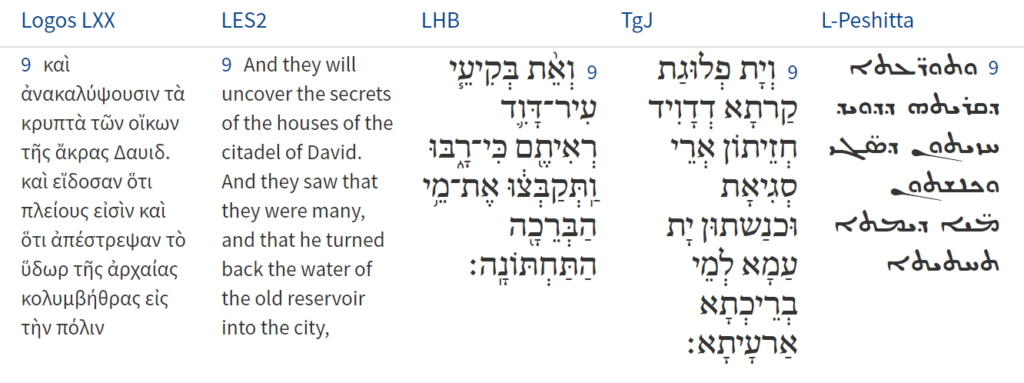
The LXX translates saying καὶ ἀνακαλύψουσιν τὰ κρυπτὰ τῶν οἴκων “and uncover the secrets of the house” וְאֵת בְּקִיעֵי עִיר-דָּוִד רְאִיתֶם “you see the breaches of the city of David.” The TgJ writes “9 And the breaches of the city of David ye shall see, because they are many; and ye shall gather together the people to the lower pool.” The L-Peshitta says essentially the same thing. We consider this interpretation of breaches that reveal the hidden secrets, this reminds us of the sins that we hide so others do not see. Note how the sins are committed in the darkness, so as to hide from others. In addition, at this time in history, Israel was involved in grievous sins, idolatry, immorality, and bloodshed, and we are seeing the culmination of these sins and their final outcome which is devastation and death. The LXX provides us an interesting interpretation as Yeshua said according to Luke 12:3, “For nothing is hidden that will not be made manifest, nor is anything secret that will not be known and come to light.” (ܟܾ݁ܠ ܓܷ݁ܝܪ ܕܱ݁ܒ݂ܚܶܫܽܘܟ݂ܳܐ ܐܷܡܰܪܬܾ݁ܘܢ ܆ ܒ݁ܢܰܗܺܝܪܴܐ ܢܶܫܬ݁ܡܰܥ ܂ ܘܡܶܕܷ݁ܡ ܕܱ݁ܒ݂ܬ݂ܱܘܳܢܷ̈ܐ ܒܷ݁ܐܕ݂ܢܷ̈ܐ ܠܱܚܶܫܬܾ݁ܘܢ ܆ ܥܰܠ ܐܷܓܴ݁ܪܷ̈ܐ ܢܶܬ݂ܟ݁ܪܷܙ ܂ 3 ἀνθʼ ὧν ὅσα ἐν τῇ σκοτίᾳ εἴπατε ἐν τῷ φωτὶ ἀκουσθήσεται, καὶ ὃ πρὸς τὸ οὖς ἐλαλήσατε ἐν τοῖς ταμείοις κηρυχθήσεται ἐπὶ τῶν δωμάτων.) Yeshua speaks of our sins being brought to light, our not being able to hide our sins before God or anyone else on that great day of judgment. Note he says ἀνθʼ ὧν ὅσα ἐν τῇ σκοτίᾳ εἴπατε ἐν τῷ φωτὶ ἀκουσθήσεται, καὶ ὃ πρὸς τὸ οὖς ἐλαλήσατε ἐν τοῖς ταμείοις κηρυχθήσεται ἐπὶ τῶν δωμάτων translates roughly “all that is in the darkness will be heard in the light” drawing in a similar concept. The Peshitta writes ܟܾ݁ܠ ܓܷ݁ܝܪ ܕܱ݁ܒ݂ܚܶܫܽܘܟ݂ܳܐ ܐܷܡܰܪܬܾ݁ܘܢ “all from darkness will be announced” ܒ݁ܢܰܗܺܝܪܴܐ ܢܶܫܬ݁ܡܰܥ “Illuminated heard.” These things reveal that darkness represents sin, and light represents righteousness and truth. In addition, the Greek translation speaks of the “secrets of the house (οἴκων)” where the house is to be a holy place for speaking the word of God according to the Shema (Devarim / Deuteronomy 6) a place of fellowship, and a dwelling place of God when we consider the Torah perspective. One of the key ways to clean up this house of darkness that Isaiah is speaking of Read a few verses from the Scriptures each morning before getting started with one’s daily routine. Reflect upon those verses all throughout the day and ask ourselves how we might adapt these verses to our modern life, how it can be expressed in our lives to bring glory to God! Then we can pray, for family, for others, for government, there is so much that one can do, and this is one of the ways to start the process of Teshuvah. Isaiah goes on saying the following in Isaiah 22:10.
ספר ישעיה פרק כב
י וְאֶת-בָּתֵּי יְרוּשָׁלַם סְפַרְתֶּם וַתִּתְצוּ הַבָּתִּים לְבַצֵּר הַחוֹמָה:
Isaiah 22:10 states, “And ye have numbered the houses of Jerusalem, and the houses have ye broken down to fortify the wall. (וְאֶת-בָּתֵּי יְרוּשָׁלַם סְפַרְתֶּם וַתִּתְצוּ הַבָּתִּים לְבַצֵּר הַחוֹמָה)” Here is an interesting conclusion that ties into our earlier interpretation on Isaiah 22:9. Here we find the idea of breaking down the houses to fortify the city walls. Isn’t this an interesting analogy to tearing down wickedness, which has the outcome of fortifying a people, a land, and a city? The TgJ interprets this saying “10 And ye shall number the houses of Jerusalem, and ye shall break down the houses to fortify the wall” which is consistent with the MSS. This idea of demolishing buildings inside of the city walls to fortify or repair broken places (2 Chronicles 32:5), the reinforcing and repair of the walls is not without historical precedence. The Spiritual insight this draws out for us is found in this idea of tearing down the houses, specifically the hidden secrets which are filled with the sins of the people through repentance and return to the holy and righteous ways of God! This means that it does not matter what time or moment or event that is currently happening around us, that if we repent and turn from our sins with the help of God in heaven by faith in His Messiah Yeshua, this will repair the breach with God in heaven and then healing and deliverance may then take place! Isaiah goes on saying the following:
ספר ישעיה פרק כב
יא וּמִקְוָה | עֲשִֹיתֶם בֵּין הַחֹמֹתַיִם לְמֵי הַבְּרֵכָה הַיְשָׁנָה וְלֹא הִבַּטְתֶּם אֶל-עֹשֶֹיהָ וְיֹצְרָהּ מֵרָחוֹק לֹא רְאִיתֶם:
Isaiah 22:11 states, “Ye made also a ditch between the two walls for the water of the old pool: (וּמִקְוָה | עֲשִֹיתֶם בֵּין הַחֹמֹתַיִם לְמֵי הַבְּרֵכָה הַיְשָׁנָה) but ye have not looked unto the maker thereof, neither had respect unto him that fashioned it long ago. (וְלֹא הִבַּטְתֶּם אֶל-עֹשֶֹיהָ וְיֹצְרָהּ מֵרָחוֹק לֹא רְאִיתֶם)” Isaiah 22:11 opens with the word וּמִקְוָה “mikvah” which has so much meaning, the mikvah is the gathering place for Mayim Khayim (Living Waters) which has so much spiritual significance. The TgJ writes “11 And ye shall make a lake between the walls of the water of the old pool: but ye have not looked unto the maker thereof, neither had respect unto him that created it of old.” This is consistent with the MSS and suggests that the people were involved in creating their own source of life as opposed to הִבַּטְתֶּם אֶל-עֹשֶֹיהָ “looking to their maker.” Comparison of Isaiah 22:11 shows us the following.
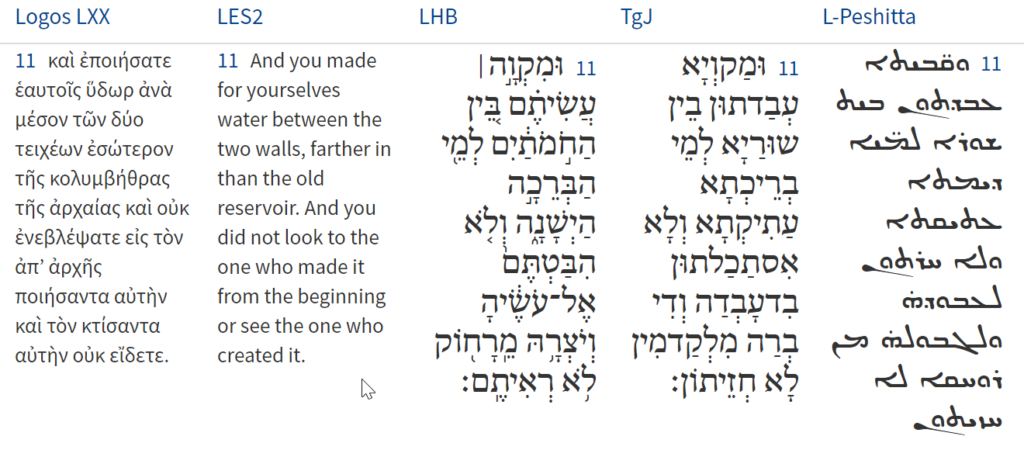
The LXX write that they did not only look to the old reservoir, but also did not look to the one who made the Living Waters or see the one who created it. This speaks to the foundation of our faith, drawing upon the old ways, the ways of truth, life, holiness, and righteousness. Note that the one who created all things, if one does not look to Him who is able to do all things, to deliver us from anything, such a person is very foolish. (See Isaiah 37:26, 40:21, 40:28, and 41:21-29) These things reveal to us how important it is to look to our maker who lays out a coherent system of morals and ethics that are filled with kindness, gentleness, mercy, and grace. This provides an illustration for us that people will do what they please, either they will humble their hearts to submit their lives to the Lord, or they will do as they please walking in their own ways. Here these things describe Judah trusting in her defenses instead of the Lord (Isaiah 22:8-11). We note that God is calling the people to repentance, but they instead decided to throw parties for the purpose of ignoring the coming destruction. Isaiah continues saying the following:
ספר ישעיה פרק כב
יב וַיִּקְרָא אֲדֹנָי יְהוִֹה צְבָאוֹת בַּיּוֹם הַהוּא לִבְכִי וּלְמִסְפֵּד וּלְקָרְחָה וְלַחֲגֹר שָֹק:
Isaiah 22:12 states, “And in that day did the Lord GOD of hosts call to weeping, and to mourning, and to baldness, and to girding with sackcloth: (וַיִּקְרָא אֲדֹנָי יְהוִֹה צְבָאוֹת בַּיּוֹם הַהוּא לִבְכִי וּלְמִסְפֵּד וּלְקָרְחָה וְלַחֲגֹר שָֹק)” Here it appears that Isaiah is stating that it is the Lord who calls for the people to mourn in order to show remorse for their sins. We note that being sorrowful is as one being sad that he or she got caught. The act of being sorrowful alone is not enough. True repentances are coupled to true acts of Teshuvah. (Tehillim / Psalms 51:17-21, Joel 2:12, Amos 8:10, Malachi 1:8-11, Isaiah 32:11-13, and Acts 5:1-11) The people however decide to do the opposite in rebellion as Isaiah continues saying:
ספר ישעיה פרק כב
יג וְהִנֵּה | שָֹשֹוֹן וְשִֹמְחָה הָרֹג | בָּקָר וְשָׁחֹט צֹאן אָכֹל בָּשָֹר וְשָׁתוֹת יָיִן אָכוֹל וְשָׁתוֹ כִּי מָחָר נָמוּת:
Isaiah 22:13 states, “And behold joy and gladness, slaying oxen, and killing sheep, eating flesh, and drinking wine: let us eat and drink; for tomorrow we shall die. (וְהִנֵּה | שָֹשֹוֹן וְשִֹמְחָה הָרֹג | בָּקָר וְשָׁחֹט צֹאן אָכֹל בָּשָֹר וְשָׁתוֹת יָיִן אָכוֹל וְשָׁתוֹ כִּי מָחָר נָמוּת)” So instead of the people being grieved due to their sins, they appear to revel in their sins and ignore the call of the prophet Isaiah. We note that the pagan nation Nineveh expressed repentance (Jonah 3:6-9) while the wicked people in the holy city Jerusalem embrace the partying lifestyle וְשָׁתוֹת יָיִן אָכוֹל וְשָׁתוֹ כִּי מָחָר נָמוּת “drinking wine, eating and drinking because tomorrow we die,” type of attitude. The people would rather seek their own pleasures indulging in the sins of the body rather than repent and seek the Lord in their last waking hours before they die by the sword. We note that if there was a besieging army, there would be a lot of want and lack of essential resources, especially food. The idea of flippantly slaughtering, drinking, and eating, this reveals the underlying truth of the people’s relationship with God, it is non-existent. They obviously did not believe in the afterlife, that on the day they die they will be faced with judgment. The significance of this statement is that even though something may seem hopeless, God can deliver no matter what the circumstance, and so we should always have hope. And when there is no hope, we should seek the Lord to take us home. We should diligently seek the Lord, every day of our lives, such that we do become one that is lacking as the example given in Mark 10:17-22. Isaiah goes on saying:
ספר ישעיה פרק כב
יד וְנִגְלָה בְאָזְנָי יְהֹוָה צְבָאוֹת אִם-יְכֻפַּר הֶעָוֹן הַזֶּה לָכֶם עַד-תְּמֻתוּן אָמַר אֲדֹנָי יְהֶוִֹה צְבָאוֹת:
Isaiah 22:14 states, “And it was revealed in mine ears by the LORD of hosts, (וְנִגְלָה בְאָזְנָי יְהֹוָה צְבָאוֹת) Surely this iniquity shall not be purged from you till ye die, saith the Lord GOD of hosts. (אִם-יְכֻפַּר הֶעָוֹן הַזֶּה לָכֶם עַד-תְּמֻתוּן אָמַר אֲדֹנָי יְהֶוִֹה צְבָאוֹת)” We note here that this is the description of the point of no return. Unrepentant sin is the only way of life forward from this point onwards. This is the outcome, death, and only death can purge the sin from the body. Note, it is important to recognize how sin is connected to the body. When one dies, based upon this text, this is the only way to separate sin from the body. It is important to note that sin being separated from the body in death does not mean that one is forever free from the effect of sin if we consider what the prophet Daniel says according to Daniel 12:2-3.
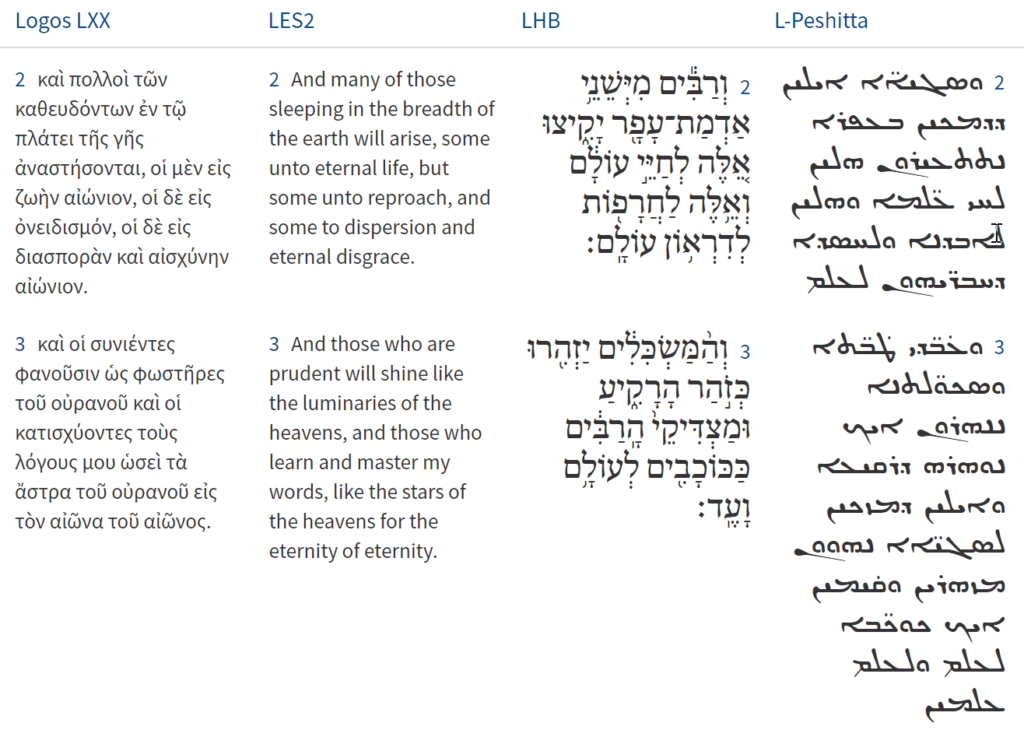
Here Daniel speaks of the end of days, those whose ashes are in the breadth of the earth. The resurrection of the dead, some will raise unto eternal life, and some will raise to eternal disgrace. The Hebrew text states they will raise to לְדִרְא֥וֹן עוֹלָֽם “everlasting abhorrence.” What we note here is in the resurrection there are some who received merciful cleansing unto eternal life and there are others who do not. Those who do not are those who as Isaiah says the Lord spoke to him saying, אִם-יְכֻפַּר הֶעָוֹן הַזֶּה לָכֶם עַד-תְּמֻתוּן אָמַר אֲדֹנָי יְהֶוִֹה צְבָאוֹת “Surely this iniquity shall not be purged from you till ye die, saith the Lord GOD of hosts.” The Greek text (LXX) states, 3 καὶ οἱ συνιέντες φανοῦσιν ὡς φωστῆρες τοῦ οὐρανοῦ καὶ οἱ κατισχύοντες τοὺς λόγους μου ὡσεὶ τὰ ἄστρα τοῦ οὐρανοῦ εἰς τὸν αἰῶνα τοῦ αἰῶνος “And those who are prudent will shine like the luminaries of the heavens, and this who master my words, like the stars of the heavens for the eternity of eternity.” Note καὶ οἱ κατισχύοντες τοὺς λόγους μου ὡσεὶ τὰ ἄστρα “and he who has power over the word we will be as the stars” this alludes to studying God’s words. In light of these texts, how significant is it to study God’s word daily? Note these people choosing to party as opposed to repent, they are blind, deaf, and fat hearted as the Torah describes the people of that generation. Their sins will not be atoned for, they will not be forgiven, because the people refused to recognize their sins, humble themselves, and seek the forgiveness of God. The only way to be a part of the first group, being resurrected to eternal life, is to trust in the Lord and His promises (Isaiah 27:9, 2 Chronicles 7:14, Romans 5:1-2) and His Messiah Yeshua. We note what this teaches us is that God is all in all He holds our temporal and eternal destiny in his hands, there is no escaping from the Lord God Almighty, the Creator of all things. This is why the Lord God Almighty sent us Yeshua and why Yeshua said what he did in the following references:
Matthew 10:38
10:38 “And he who does not take his cross and follow after Me is not worthy of Me. (NASB, ܘܟ݂ܽܠ ܕ݁ܠܴܐ ܫܳܩܶܠ ܙܩܺܝܦ݂ܶܗ ܘܳܐܬ݂ܷܐ ܒܴ݁ܬ݂ܱܪܝ ܠܴܐ ܫܳܘܶܐ ܠܻܝ ܂ וּמִי שֶׁאֵינוֹ לוֹקֵחַ אֶת צְלָבוֹ וְהוֹלֵךְ אַחֲרַי אֵינוֹ כְּדַאי לִי.)
Matthew 16:24
16:24 Then Jesus said to His disciples, “If anyone wishes to come after Me, let him deny himself, and take up his cross, and follow Me. (NASB, ܗܳܝܕܷ݁ܝܢ ܐܷܡܰܪ ܝܶܫܽܘܥ ܠܬ݂ܱܠܡܺܝ̈ܕ݂ܰܘܗ̄ܝ ܂ ܡܰܢ ܕ݁ܨܴܒ݂ܶܐ ܕ݁ܢܺܐܬ݂ܷܐ ܒܴ݁ܬ݂ܱܪܝ ܂ ܢܶܟ݂ܦܾ݁ܘܪ ܒ݁ܢܰܦ݂ܫܶܗ ܂ ܘܢܶܫܩܽܘܠ ܙܩܺܝܦ݂ܶܗ ܂ ܘܢܺܐܬ݂ܷܐ ܒܴ݁ܬ݂ܱܪܝ ܂ אָז אָמַר יֵשׁוּעַ לְתַלְמִידָיו׃ ״מִי שֶׁרוֹצֶה לָבוֹא אַחֲרַי, שֶׁיִּתְכַּחֵשׁ לְעַצְמוֹ וְיִקַּח אֶת צְלָבוֹ וְיֵלֵךְ אַחֲרַי;)
Mark 8:34
8:34 And He summoned the multitude with His disciples, and said to them, “If anyone wishes to come after Me, let him deny himself, and take up his cross, and follow Me. (NASB, ܘܰܩܪܴܐ ܝܶܫܽܘܥ ܠܟ݂ܶܢ̈ܫܶܐ ܁ ܥܰܡ ܬܱ݁ܠܡܺܝ̈ܕ݂ܰܘܗ̄ܝ ܂ ܘܶܐܡܰܪ ܠܗܽܘܢ ܂ ܡܰܢ ܕ݁ܨܴܒ݂ܶܐ ܁ ܕ݁ܢܺܐܬ݂ܷܐ ܒܴ݁ܬ݂ܱܪܝ ܆ ܢܶܟ݂ܦܾ݁ܘܪ ܒ݁ܢܰܦ݂ܫܶܗ ܂ ܘܢܶܫܩܽܘܠ ܙܩܺܝܦ݂ܶܗ ܂ ܘܢܺܐܬ݂ܷܐ ܒܴ݁ܬ݂ܱܪܝ ܂ קָרָא אֵלָיו אֶת הֶהָמוֹן עִם תַּלְמִידָיו וְאָמַר לָהֶם׃ ״מִי שֶׁרוֹצֶה לָבוֹא אַחֲרַי, שֶׁיִּתְכַּחֵשׁ לְעַצְמוֹ וְיִקַּח אֶת צְלָבוֹ וְיֵלֵךְ אַחֲרַי;)
Luke 5:27
5:27 And after that He went out, and noticed a tax-gatherer named Levi, sitting in the tax office, and He said to him, “Follow Me.” (NASB, ܒܴ݁ܬ݂ܱܪ ܗܳܠܷܝܢ ܢܦ݂ܰܩ ܝܶܫܽܘܥ ܆ ܘܰܚܙܳܐ ܡܳܟ݂ܣܳܐ ܕܱ݁ܫܡܶܗ ܠܷܘܺܝ ܂ ܕ݁ܝܳܬ݂ܷܒ݂ ܒܷ݁ܝܬ݂ ܡܳܟ݂ܣܷ̈ܐ ܂ ܘܶܐܡܰܪ ܠܷܗ ܂ ܬܴ݁ܐ ܒܴ݁ܬ݂ܱܪܝ ܂ בְּצֵאתוֹ אַחֲרֵי כֵן רָאָה מוֹכֵס יוֹשֵׁב בְּבֵית הַמֶּכֶס וּשְׁמוֹ לֵוִי. אָמַר לוֹ יֵשׁוּעַ׃ ״לֵךְ אַחֲרַי״.)
Luke 9:23
9:23 And He was saying to them all, “If anyone wishes to come after Me, let him deny himself, and take up his cross daily, and follow Me. (NASB, ܘܳܐܡܰܪ ܗ̄ܘܳܐ ܩܕ݂ܳܡ ܟܾ݁ܠܢܳܫ ܂ ܡܰܢ ܕ݁ܨܴܒ݂ܶܐ ܕ݁ܢܺܐܬ݂ܷܐ ܒܴ݁ܬ݂ܱܪܝ ܆ ܢܶܟ݂ܦܾ݁ܘܪ ܒ݁ܢܰܦ݂ܫܶܗ ܂ ܘܢܶܫܩܽܘܠ ܙܩܺܝܦ݂ܶܗ ܟܾ݁ܠܝܽܘܡ ܂ ܘܢܺܐܬ݂ܷܐ ܒܴ݁ܬ݂ܱܪܝ ܂ אָמַר אֶל הַכֹּל׃ ״מִי שֶׁרוֹצֶה לָבוֹא אַחֲרַי, שֶׁיִּתְכַּחֵשׁ לְעַצְמוֹ וְיִשָּׂא אֶת צְלָבוֹ יוֹם יוֹם וְיֵלֵךְ אַחֲרַי;)
We are not to look to our leaders for how to act, just as Isaiah is warning us, the high officials are not concerned for the interests of the people. On the other hand, we can safely follow the Messiah of God because he has the interests of His people, guiding us and showing us the way, how to walk in God’s holy ways, and to persevere in the faith. Isaiah continues saying the following:
ספר ישעיה פרק כב
טו כֹּה אָמַר אֲדֹנָי יְהֶוִֹה צְבָאוֹת לֶךְ-בֹּא אֶל-הַסֹּכֵן הַזֶּה עַל-שֶׁבְנָא אֲשֶׁר עַל-הַבָּיִת: טז מַה-לְּךָ פֹה וּמִי לְךָ פֹה כִּי-חָצַבְתָּ לְּךָ פֹּה קָבֶר חֹצְבִי מָרוֹם קִבְרוֹ חֹקְקִי בַסֶּלַע מִשְׁכָּן לוֹ:
Isaiah 22:15 states, “Thus saith the Lord GOD of hosts, Go, get thee unto this treasurer, even unto Shebna, which is over the house, and say, (כֹּה אָמַר אֲדֹנָי יְהֶוִֹה צְבָאוֹת לֶךְ-בֹּא אֶל-הַסֹּכֵן הַזֶּה עַל-שֶׁבְנָא אֲשֶׁר עַל-הַבָּיִת)” Isaiah 22:16, “What hast thou here? and whom hast thou here, (מַה-לְּךָ פֹה וּמִי לְךָ פֹה) that thou hast hewed thee out a sepulcher here, as he that heweth him out a sepulcher on high, and that graveth an habitation for himself in a rock? (כִּי-חָצַבְתָּ לְּךָ פֹּה קָבֶר חֹצְבִי מָרוֹם קִבְרוֹ חֹקְקִי בַסֶּלַע מִשְׁכָּן לוֹ)” It almost appears as if Isaiah is shifting his focus here in the narrative as the Lord God directs him to speak אֶל־הַסֹּכֵ֣ן הַזֶּ֔ה עַל־שֶׁבְנָ֖א “unto the treasurer, unto Shebna.” The commentaries on this verse, most agree that this verse is not to be understood as separate from Isaiah 22:1-14. It is not a separate oracle but a part of the total content of the chapter. The repetition of the Lord God of Hosts from Isaiah 22:14 to 22:15 is evidence of the Lord speaking to Isaiah on how he is to proceed with his oracle.
ספר ישעיה פרק כב
יד וְנִגְלָה בְאָזְנָי יְהֹוָה צְבָאוֹת אִם-יְכֻפַּר הֶעָוֹן הַזֶּה לָכֶם עַד-תְּמֻתוּן אָמַר אֲדֹנָי יְהֶוִֹה צְבָאוֹת:
טו כֹּה אָמַר אֲדֹנָי יְהֶוִֹה צְבָאוֹת לֶךְ-בֹּא אֶל-הַסֹּכֵן הַזֶּה עַל-שֶׁבְנָא אֲשֶׁר עַל-הַבָּיִת:
Here the narrative shifts to those who are proud and set themselves up as persons of importance. We note that this person described as הַסֹּכֵן “the sochen,” (treasurer) this word only occurs twice in the Hebrew bible as spelled.

The question then is to who this person is that God is referring to? The commentaries state that this was a very high official, and that it seems that the Lord God is singling out the ones who lead the people. Note the phrase אֲשֶׁר עַל-הַבָּיִת “that is over the house” indicates that this official is over Judah, and so the tendency is to believe that God is directing our attention to the source of the rebellious ones to the very highest levels of office in the country. This is exactly what is taking place today in our society and cultures throughout the world, promoting LGBTQ ideologies, claiming that men can become pregnant, among other nonsensical nonsense and mental illness, hoping the people will be as weak minded as they are to believe such ridiculous things and at the same time turn from God’s holy and righteous ways. This is the importance of what Yeshua said concerning denying self and following him! Isaiah 22:16 speaks to building a tomb. This reminds us of Yeshua’s words according to Matthew 23:27-28.
Matthew 23:27-28
23:27 “Woe to you, scribes and Pharisees, hypocrites! For you are like whitewashed tombs which on the outside appear beautiful, but inside they are full of dead men’s bones and all uncleanness. 23:28 “Even so you too outwardly appear righteous to men, but inwardly you are full of hypocrisy and lawlessness. (NASB, ܘܳܝ ܁ ܠܟ݂ܽܘܢ ܁ ܣܳܦ݂ܪܷ̈ܐ ܘܰܦ݂ܪܻ̈ܝܫܶܐ ܂ ܢܳܣܒܱ݁ܝ̈ ܒܱ݁ܐܦܷ̈݁ܐ ܅ ܕ݁ܕ݂ܳܡܶܝܢ ܐܢ̄ܬܾ݁ܘܢ ܠܩܰܒ݂ܪܷ̈ܐ ܡܰܟ݂̈ܠܫܶܐ ܂ ܕ݁ܡܶܢ ܠܒ݂ܰܪ ܡܶܬ݂ܚܙܶܝܢ ܫܰܦܻ݁ܝܪܷ̈ܐ ܆ ܡܶܢ ܠܓ݂ܰܘ ܕܷ݁ܝܢ ܡܠܷܝܢ ܓܱ݁ܪ̈ܡܶܐ ܕ݁ܡܺܝ̈ܬ݂ܷܐ ܂ ܘܟ݂ܽܠܴܗ ܛܱܢܦ݂ܽܘܬ݂ܴܐ ܂ 28 ܗܳܟ݂ܰܢܳܐ ܐܴܦ݂ ܐܱܢ̄ܬܾ݁ܘܢ ܁ ܡܶܢ ܠܒ݂ܰܪ ܡܶܬ݂ܚܙܶܝܢ ܐܢ̄ܬܾ݁ܘܢ ܠܱܒ݂ܢܱ̈ܝ ܐ̱ܢܴ̈ܫܳܐ ܐܱܝܟ݂ ܙܰܕܻ݁ܝ̈ܩܶܐ ܆ ܘܡܶܢ ܠܓ݂ܰܘ ܡܠܷܝܢ ܐܢ̄ܬܾ݁ܘܢ ܥܰܘܠܴܐ ܂ ܘܡܰܣܰܒ݂ ܒܱ݁ܐܦܷ̈݁ܐ ܀ אוֹי לָכֶם סוֹפְרִים וּפְרוּשִׁים צְבוּעִים, כִּי דּוֹמִים אַתֶּם לִקְבָרִים מְסֻיָּדִים הַנִּרְאִים יָפִים מִבַּחוּץ וְאִלּוּ תּוֹכָם מָלֵא עַצְמוֹת מֵתִים וְכָל טֻמְאָה. כָּךְ גַּם אַתֶּם׃ מִבַּחוּץ אַתֶּם נִרְאִים צַדִּיקִים לְעֵינֵי הַבְּרִיוֹת, אֲבָל בִּפְנִים מְלֵאֵי צְבִיעוּת וְעָוֶל. )
The idea here is one of pride, again this is a common theme in the book of Isaiah. Here the הַסֹּכֵ֣ן הַזֶּ֔ה עַל־שֶׁבְנָ֖א “the treasurer of Shebna” builds himself a tomb in the hillside across the Kidron east of the city of David where the village of Silwan is now located. John Oswalt states, “A number of fine rock-cut tombs exist there, including the one attributed to Solomon’s wife, the daughter of Pharaoh. In fact, it is possible that Shebna’s particular tomb has been discovered in that area. Clermont-Ganneau gave the first report of the find in 1871, and in 1953 N. Avigad published a translation of the inscription, identifying the tomb as belonging to “[ ] yahu, who is over the house.” While this suggestion is very tantalizing, it must be borne in mind that names ending in -yah(u) were exceedingly common in biblical times and that there may have been several stewards who bore this kind of name.” Here Isaiah 22:16 is actually asking a question, כִּי-חָצַבְתָּ לְּךָ פֹּה קָבֶר חֹצְבִי מָרוֹם קִבְרוֹ חֹקְקִי בַסֶּלַע מִשְׁכָּן לוֹ “What hast thou here? and whom hast thou here, (מַה-לְּךָ פֹה וּמִי לְךָ פֹה) that thou hast hewed thee out a sepulcher here, as he that heweth him out a sepulcher on high, and that graveth an habitation for himself in a rock?” The reason being, this official has no Jewish nobility, he is not descended from the kings of Israel, and so what right does he have cutting out a tomb here in the hillside of this blessed and Holy Land? The point of all of these things speaks to us concerning the failure of self-sufficiency and the need for trusting whole heartedly in the Lord! The prophets of Israel were sent to the people when they trusted in themselves and forgot about the Lord God in heaven. (Isaiah 7:3-4, 1 Samuel 13:10, 1 Kings 13:1-6, 18:16-17). We note that these things speak to us concerning our place before the Almighty God. We cannot escape from His presence, one day we will be raised up from the dead, either to eternal life or to everlasting destruction. We cannot avoid this outcome, and it is one of two outcomes, which is decided upon whether we have remained in the Lord God Almighty, or sought our own ways and walked away from the Lord in heaven. Regardless of who we are, the Lord God, He will find us, and most importantly this will happen at a time that one wishes to avoid him (Tehillim / Psalms 139:7-12). The point of these Scriptures for us today is to not avoid the Lord God or our responsibility to seek Him. We are to seek to be with him every waking moment of every day by faith in His Messiah Yeshua! Then it is guaranteed that we will be resurrected to eternal life, just as Daniel wrote (Daniel 12:2-3) the righteous will inherit eternal life, these words Yeshua quoted in Matthew 25:46 “And these will go away into eternal punishment, but the righteous into eternal life.” These truths are eternal, and so we should do everything we can, to seek the Lord, to repent, and turn from our sins, and walk in the footsteps of the Messiah!
Rabbinic Literature
The Targum Jonathan is an Aramaic and Rabbinic translation of the book of Isaiah and therefore is a valuable resource for further study on the book of Isaiah!
תרגום יונתן בן עוזיאל אל ישעיה פרק כב:ט-טז
ט וְיָת פְלוּגַת קַרתָא דְדָוִיד חְזֵיתֹון אְרֵי סְגִיאָת וּכנַשתוּן יָת עַמָא לְמֵי בְרֵיכְתָא אַרעָיתָא׃ י וְיָת בָתֵי יְרוּשלַם מְנֵיתֹון וְתָרַעתוּן בָתַיָא לְתַקָפָא שוּרָא׃ יא וּמַקוְיָא עְבַדתוּן בֵין שוּרַיָא לְמֵי בְרֵיכְתָא עַתִיקְתָא וְלָא אִסתַכַלתוּן בִדעָבְדַה וְדִי בְרַה מִלְקַדמִין לָא חְזֵיתֹון׃ יב וְאַכלִי נְבִייָא דַיוי אְלֹהִים צְבָאֹות בְעִדָנָא הַהוּא לְמִבכֵי וּלמִספֵד וּלגִיזוּז רֵיש וּלמֵיסַר שַׂקִין׃ יג וְהָא בְיָע וְחַדוָא אָמְרִין נְקַטֵיל תֹורִין וּננַכיֵס עָן נֵיכֹול בְשַׂר וְנִשתֵי חְמַר נֵיכֹול וְנִשתֵי מִדִנמוּת וְלָא נֵיחֵי׃ יד אְמַר נְבִיָא בְאוּדנַי הְוֵיתִי שָמַע כַד אִתגְזַרַת דָא מִן קֳדָם יוי צְבָאֹות אִם יִשתְבֵיק חוּבָא הָדֵין לְכֹון עַד דִתמוּתוּן מֹותָא תִניָנָא אְמַר יוי אְלֹהִים צְבָאֹות׃ וט כִדנָן אְמַר יוי אְלֹהִים צְבָאֹות אִיזֵיל אֵיתַא לְוָת פַרנָסָא הָדֵין לְוָת שַבנָא דִממֻנַא עַל בֵיתָא׃ טז וְתֵימַר לֵיה מָא לָך כָא וּמָא לָך כְדֵין אְרֵי אַתקֵינתָא לָך כָא אְתַר אַתקֵין בְרוּמָא אַתרֵיה שַוִי בְכֵיפָא בֵית מְדֹורֵיה׃
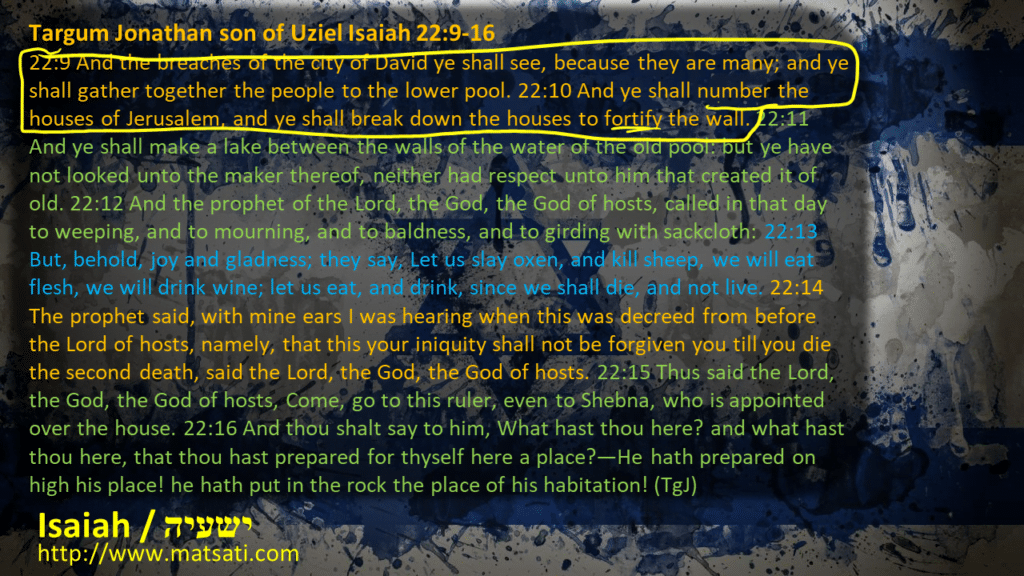
Targum Jonathan son of Uziel Isaiah 22:9-16
22:9 And the breaches of the city of David ye shall see, because they are many; and ye shall gather together the people to the lower pool. 22:10 And ye shall number the houses of Jerusalem, and ye shall break down the houses to fortify the wall. 22:11 And ye shall make a lake between the walls of the water of the old pool: but ye have not looked unto the maker thereof, neither had respect unto him that created it of old. 22:12 And the prophet of the Lord, the God, the God of hosts, called in that day to weeping, and to mourning, and to baldness, and to girding with sackcloth: 22:13 But, behold, joy and gladness; they say, Let us slay oxen, and kill sheep, we will eat flesh, we will drink wine; let us eat, and drink, since we shall die, and not live. 22:14 The prophet said, with mine ears I was hearing when this was decreed from before the Lord of hosts, namely, that this your iniquity shall not be forgiven you till you die the second death, said the Lord, the God, the God of hosts. 22:15 Thus said the Lord, the God, the God of hosts, Come, go to this ruler, even to Shebna, who is appointed over the house. 22:16 And thou shalt say to him, What hast thou here? and what hast thou here, that thou hast prepared for thyself here a place?—He hath prepared on high his place! he hath put in the rock the place of his habitation! (TgJ)
It is interesting the description of this part of Isaiah 22, states the following: ט וְיָת פְלוּגַת קַרתָא דְדָוִיד חְזֵיתֹון אְרֵי סְגִיאָת וּכנַשתוּן יָת עַמָא לְמֵי בְרֵיכְתָא אַרעָיתָא׃ 22:9 And the breaches of the city of David ye shall see, because they are many; and ye shall gather together the people to the lower pool. י וְיָת בָתֵי יְרוּשלַם מְנֵיתֹון וְתָרַעתוּן בָתַיָא לְתַקָפָא שוּרָא׃ 22:10 And ye shall number the houses of Jerusalem, and ye shall break down the houses to fortify the wall. (TgJ) Here we read how the TgJ describes the houses being torn down in the city and the materials being used for the wall of the city. This is an interesting topic in regards to “Laws of Selling Property in a Walled City” (Property Law). What is interesting is the house within a city walls are allowed to be redeemed. These houses belong to their original owner, who is able to redeem his house. The rabbinic sources for this are: Mishnah Arakhin 32a:5-12, Arakhin 31a:2-4, Arakhin 33a:8, Arakhin 31b:15-18, Shevuot 16a:17, Rosh Hashanah 6b:9, Kiddushin 20b:18-21a:2, Arakhin 31b:5-6, Gittin 74b:17, Kiddushin 21a:10, Megillah 5b:15, Yoma 65b:8-66a:1, Arakhin 33b:21, Arakhin 33b:1, Megillah 3b:13-15, Arakhin 31b:12, Arakhin 18b:9, Arakhin 32b:7-10, Mishneh Torah, Sabbatical Year and the Jubilee 12, Sefer HaChinukh 340:4-341:3. (https://www.sefaria.org/topics/laws-of-selling-property-in-a-walled-city?tab=sources) Maimonides interpretation summarizes the important points that we would like to discuss:
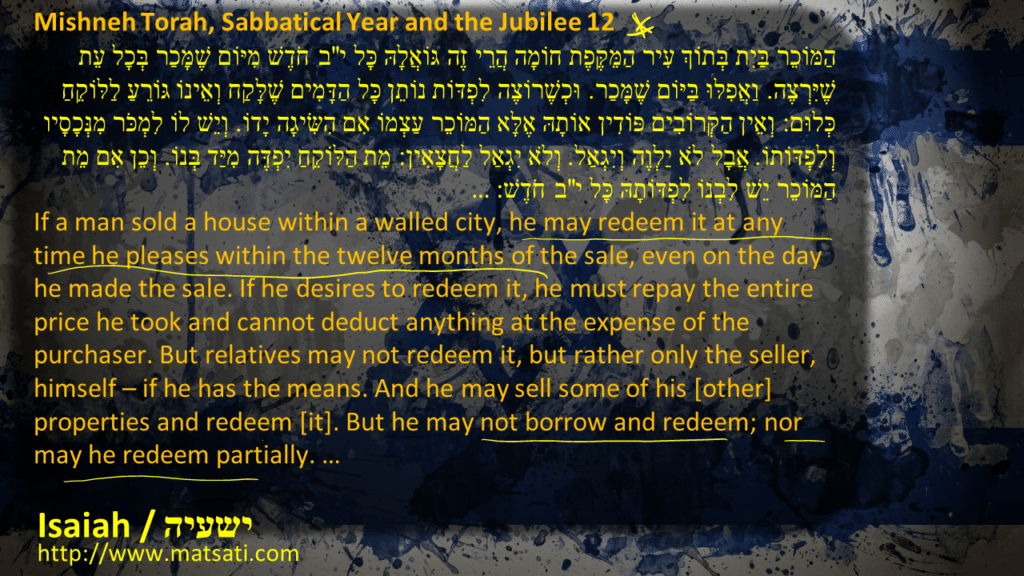
Mishneh Torah, Sabbatical Year and the Jubilee 12
הַמּוֹכֵר בַּיִת בְּתוֹךְ עִיר הַמֵּקֶּפֶת חוֹמָה הֲרֵי זֶה גּוֹאֲלָהּ כָּל י”ב חֹדֶשׁ מִיּוֹם שֶׁמָּכַר בְּכָל עֵת שֶׁיִּרְצֶה. וַאֲפִלּוּ בַּיּוֹם שֶׁמָּכַר. וּכְשֶׁרוֹצֶה לִפְדּוֹת נוֹתֵן כָּל הַדָּמִים שֶׁלָּקַח וְאֵינוֹ גּוֹרֵעַ לַלּוֹקֵחַ כְּלוּם: וְאֵין הַקְּרוֹבִים פּוֹדִין אוֹתָהּ אֶלָּא הַמּוֹכֵר עַצְמוֹ אִם הִשִּׂיגָה יָדוֹ. וְיֵשׁ לוֹ לִמְכֹּר מִנְּכָסָיו וְלִפְדּוֹתוֹ. אֲבָל לֹא יַלְוֶה וְיִגְאַל. וְלֹא יִגְאַל לַחֲצָאִין: מֵת הַלּוֹקֵחַ יִפְדֶּה מִיַּד בְּנוֹ. וְכֵן אִם מֵת הַמּוֹכֵר יֵשׁ לִבְנוֹ לִפְדּוֹתָהּ כָּל י”ב חֹדֶשׁ: …If a man sold a house within a walled city, he may redeem it at any time he pleases within the twelve months of the sale, even on the day he made the sale. If he desires to redeem it, he must repay the entire price he took and cannot deduct anything at the expense of the purchaser. But relatives may not redeem it, but rather only the seller, himself – if he has the means. And he may sell some of his [other] properties and redeem [it]. But he may not borrow and redeem; nor may he redeem partially. …
The significant point here is in regards to how the houses within the walled city are redeemable. The houses in the open fields are not redeemable, it is only within the city walls may an owner redeem his home. Isaiah and the TgJ write that the houses within the city are torn down for the repair of the city wall. In the mishna (Arakhin 31b) we read if a house was sold and not redeemed by its owners within twelve months it remains permanently in the possession of the purchaser. The Gemara describes this saying, “At first the purchaser would hide for all of the final day of the twelfth month so that the house would be confirmed as his (see Leviticus 25:29–30).” Vayikra / Leviticus 25 contains the Torat of Redemption regarding the houses within a walled city and is juxtaposed to the redemption of a poor man according to Vayikra / Leviticus 25:47-49.
ספר ויקרא פרק כה
מז וְכִי תַשִּׂיג יַד גֵּר וְתוֹשָׁב עִמָּךְ וּמָךְ אָחִיךָ עִמּוֹ וְנִמְכַּר לְגֵר תּוֹשָׁב עִמָּךְ אוֹ לְעֵקֶר מִשְׁפַּחַת גֵּר: מח אַחֲרֵי נִמְכַּר גְּאֻלָּה תִּהְיֶה-לּוֹ אֶחָד מֵאֶחָיו יִגְאָלֶנּוּ: מט אוֹ-דֹדוֹ אוֹ בֶן-דֹּדוֹ יִגְאָלֶנּוּ אוֹ-מִשְּׁאֵר בְּשָֹרוֹ מִמִּשְׁפַּחְתּוֹ יִגְאָלֶנּוּ אוֹ-הִשִּׂיגָה יָדוֹ וְנִגְאָל:
Vayikra / Leviticus 25:47-49
25:47 ‘Now if the means of a stranger or of a sojourner with you becomes sufficient, and a countryman of yours becomes so poor with regard to him as to sell himself to a stranger who is sojourning with you, or to the descendants of a stranger’s family, 25:48 then he shall have redemption right after he has been sold. One of his brothers may redeem him, 25:49 or his uncle, or his uncle’s son, may redeem him, or one of his blood relatives from his family may redeem him; or if he prospers, he may redeem himself. (NASB)
What this oracle from Isaiah suggests is the utter hopelessness of the situation the sins of the people have brought them to. If the people trust in their own means for saving themselves, all that they have, all that they own will be destroyed, even their homes. This is an important observation since sin can destroy homes, families, even today! These things speak to the need for discipleship and musar in one’s life for the purpose of moral and spiritual character development. We note how there are parallels to the city house being redeemed to the redemption of the soul. The Hebrew noun musar means “fatherly correction” which is intended to impart moral discipline and character development to a child. For example, Solomon wrote saying, “Hear, my child, the musar of your father, and forsake not the torah of your mother” (Mishley / Proverbs 6:20). “My son, despise not the chastening (musar) of the Lord; neither be weary of his correction (tokhechah).” (Mishley / Proverbs 3:11) These things are written into the Scriptures for our tutelage and so we have a means for knowing when we have walked off the path of righteousness and truth. The instruction in moral character and spiritual character development will lead to humility and recognizing the need for repentance. Isaiah goes on saying the following according to the TgJ. יא וּמַקוְיָא עְבַדתוּן בֵין שוּרַיָא לְמֵי בְרֵיכְתָא עַתִיקְתָא וְלָא אִסתַכַלתוּן בִדעָבְדַה וְדִי בְרַה מִלְקַדמִין לָא חְזֵיתֹון׃ 22:11 And ye shall make a lake between the walls of the water of the old pool: but ye have not looked unto the maker thereof, neither had respect unto him that created it of old. יב וְאַכלִי נְבִייָא דַיוי אְלֹהִים צְבָאֹות בְעִדָנָא הַהוּא לְמִבכֵי וּלמִספֵד וּלגִיזוּז רֵיש וּלמֵיסַר שַׂקִין׃ 22:12 And the prophet of the Lord, the God, the God of hosts, called in that day to weeping, and to mourning, and to baldness, and to girding with sackcloth. (TgJ) Here Isaiah speaks to the people not recognizing the Creator, and how God is calling for the people to mourn and weep due to their sins and over the events that are about to take place due to their sins. The Talmud Bavli Chagigah 5b discusses this saying the following:
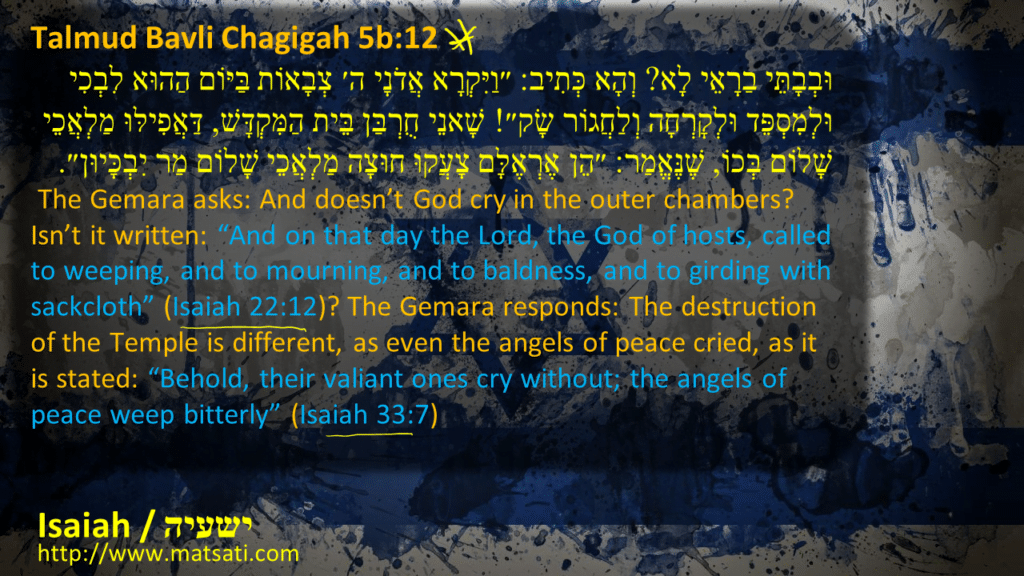
Talmud Bavli Chagigah 5b:12
וּבְבָתֵּי בַרָאֵי לָא? וְהָא כְּתִיב: ״וַיִּקְרָא אֲדֹנָי ה׳ צְבָאוֹת בַּיּוֹם הַהוּא לִבְכִי וּלְמִסְפֵּד וּלְקׇרְחָה וְלַחֲגוֹר שָׂק״! שָׁאנֵי חֻרְבַּן בֵּית הַמִּקְדָּשׁ, דַּאֲפִילּוּ מַלְאֲכֵי שָׁלוֹם בְּכוֹ, שֶׁנֶּאֱמַר: ״הֵן אֶרְאֶלָּם צָעֲקוּ חוּצָה מַלְאֲכֵי שָׁלוֹם מַר יִבְכָּיוּן״.
The Gemara asks: And doesn’t God cry in the outer chambers? Isn’t it written: “And on that day the Lord, the God of hosts, called to weeping, and to mourning, and to baldness, and to girding with sackcloth” (Isaiah 22:12)? The Gemara responds: The destruction of the Temple is different, as even the angels of peace cried, as it is stated: “Behold, their valiant ones cry without; the angels of peace weep bitterly” (Isaiah 33:7).
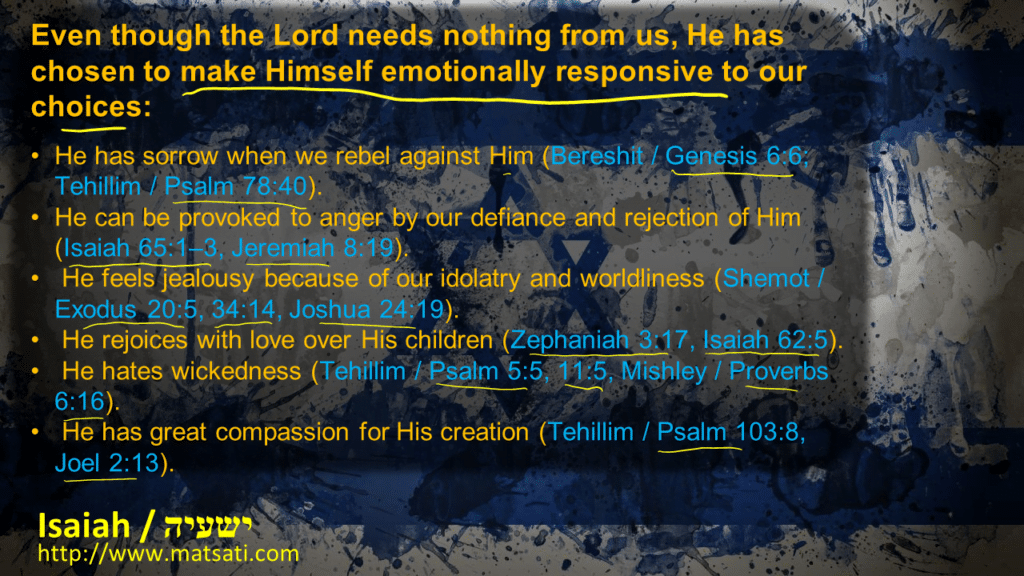
We note how the rabbis describe the Lord God crying in the outer chambers. This illustrates for us again the kind of relationship that we have with the Lord, a covenant relationship that is analogous to a marriage covenant. Even though the Lord needs nothing from us, He has chosen to make Himself emotionally responsive to our choices:
He has sorrow when we rebel against Him (Bereshit / Genesis 6:6; Tehillim / Psalm 78:40).
He can be provoked to anger by our defiance and rejection of Him (Isaiah 65:1–3, Jeremiah 8:19).
He feels jealousy because of our idolatry and worldliness (Shemot / Exodus 20:5, 34:14, Joshua 24:19).
He rejoices with love over His children (Zephaniah 3:17, Isaiah 62:5).
He hates wickedness (Tehillim / Psalm 5:5, 11:5, Mishley / Proverbs 6:16).
He has great compassion for His creation (Tehillim / Psalm 103:8, Joel 2:13).
What these things describe for us is how the Lord God Almighty understands our feelings. He created us with the ability to weep and so He also allows Himself to weep. These things again describe the type of relationship that we have with the Lord God Almighty our Father in heaven. This also describes how being a child of God, we are under Fatherly correction from heaven. Because of this we should always be aware of correction from the Lord, in whatever form it may be, always remain repentant of sin and strive to walk in the ways of the Lord just as Yeshua the Messiah has shown us in His life according to the Gospels (Matthew, Mark, Luke, and John). Midrash Tehillim 20:1 writes the following concerning this verse in Isaiah.
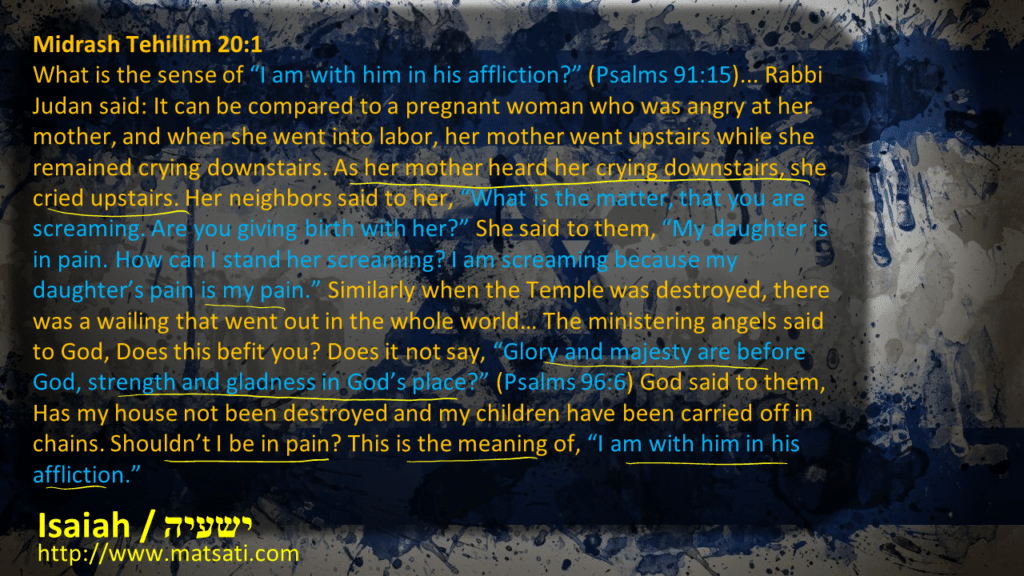
Midrash Tehillim 20:1
What is the sense of “I am with him in his affliction?” (Psalms 91:15)… Rabbi Judan said: “It can be compared to a pregnant woman who was angry at her mother, and when she went into labor, her mother went upstairs while she remained crying downstairs. As her mother heard her crying downstairs, she cried upstairs. Her neighbors said to her, “What is the matter, that you are screaming. Are you giving birth with her?” She said to them, “My daughter is in pain. How can I stand her screaming? I am screaming because my daughter’s pain is my pain.” Similarly when the Temple was destroyed, there was a wailing that went out in the whole world… The ministering angels said to God, “Does this befit you? Does it not say, “Glory and majesty are before God, strength and gladness in God’s place?” (Psalms 96:6) God said to them, “Has my house not been destroyed and my children have been carried off in chains. Shouldn’t I be in pain? This is the meaning of, “I am with him in his affliction.”
We note that regardless of one’s sins, the Lord God Almighty loves and cares about what happens to those whom He loves. This is an important concept which reveals to us that it does not matter what level of sin or debauchery that one has partaken in, the doors to repentance are always open to perform Teshuvah, turn from the sin, and seek the forgiveness of God by faith in Yeshua the Messiah! The danger is becoming so sinful, so callous to sin, that one is unable to repent, unable to recognize his or her unrighteous and idolatrous deeds. This is the point of no return. This is how the people responded to Isaiah’s claims, instead of repenting and mourning, they burst out in celebration. יג וְהָא בְיָע וְחַדוָא אָמְרִין נְקַטֵיל תֹורִין וּננַכיֵס עָן נֵיכֹול בְשַׂר וְנִשתֵי חְמַר נֵיכֹול וְנִשתֵי מִדִנמוּת וְלָא נֵיחֵי׃ 22:13 But, behold, joy and gladness; they say, Let us slay oxen, and kill sheep, we will eat flesh, we will drink wine; let us eat, and drink, since we shall die, and not live. (TgJ) So the people did not care about their final outcome or their position before the God in heaven, they decided to simply be glad and filled with joy in their sins, to eat, drink, then they will die. The Talmud Bavli Taanit 11a writes the following concerning this approach to life.
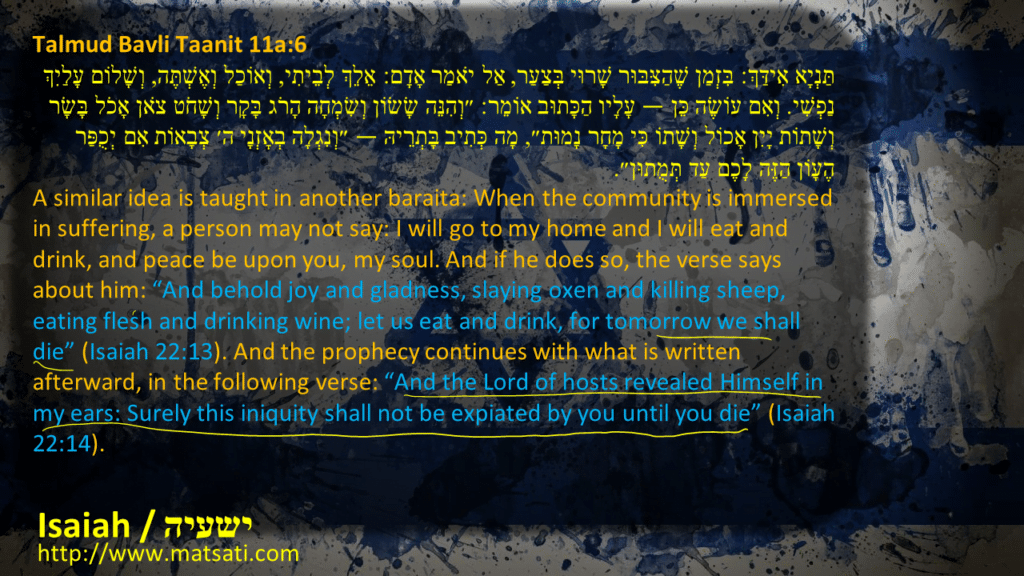
Talmud Bavli Taanit 11a:6
תַּנְיָא אִידַּךְ: בִּזְמַן שֶׁהַצִּבּוּר שָׁרוּי בְּצַעַר, אַל יֹאמַר אָדָם: אֵלֵךְ לְבֵיתִי, וְאוֹכַל וְאֶשְׁתֶּה, וְשָׁלוֹם עָלַיִךְ נַפְשִׁי. וְאִם עוֹשֶׂה כֵּן — עָלָיו הַכָּתוּב אוֹמֵר: ״וְהִנֵּה שָׂשׂוֹן וְשִׂמְחָה הָרֹג בָּקָר וְשָׁחֹט צֹאן אָכֹל בָּשָׂר וְשָׁתוֹת יָיִן אָכוֹל וְשָׁתוֹ כִּי מָחָר נָמוּת״, מָה כְּתִיב בָּתְרֵיהּ — ״וְנִגְלָה בְאׇזְנָי ה׳ צְבָאוֹת אִם יְכֻפַּר הֶעָוֹן הַזֶּה לָכֶם עַד תְּמֻתוּן״.
A similar idea is taught in another baraita: When the community is immersed in suffering, a person may not say: I will go to my home and I will eat and drink, and peace be upon you, my soul. And if he does so, the verse says about him: “And behold joy and gladness, slaying oxen and killing sheep, eating flesh and drinking wine; let us eat and drink, for tomorrow we shall die” (Isaiah 22:13). And the prophecy continues with what is written afterward, in the following verse: “And the Lord of hosts revealed Himself in my ears: Surely this iniquity shall not be expiated by you until you die” (Isaiah 22:14).
The entire concept here is when one is mourning one does not go home, eat and drink, and say peace be upon you and my soul. The very next verse (Isaiah 22:14) explains that for such people, their iniquity will be expiated by their death. But note that this is not an atonning expiation, this is what it means to die in one’s sins, similar to what Yeshua says according to John 8:21 and 8:24.
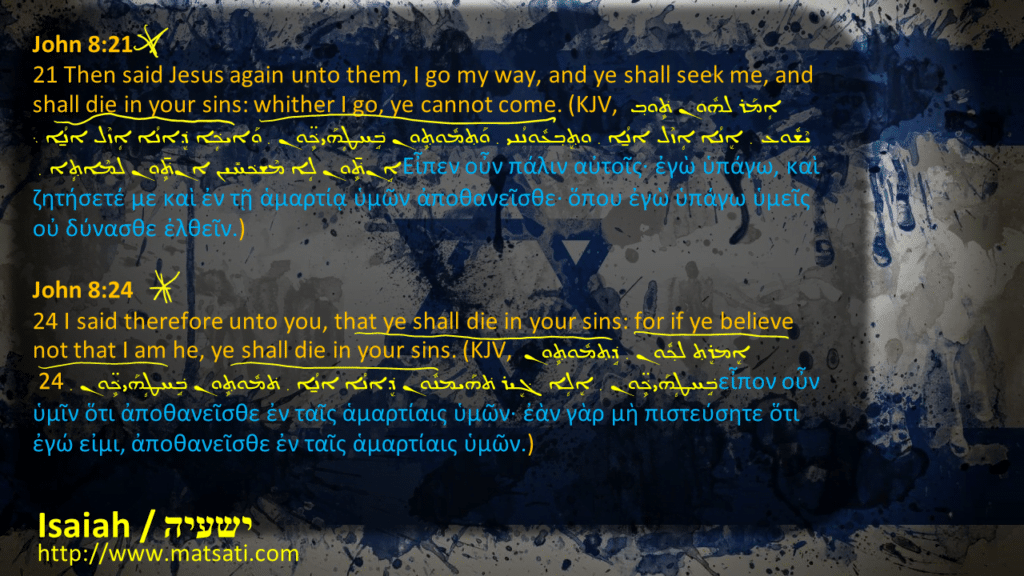
John 8:21
21 Then said Jesus again unto them, I go my way, and ye shall seek me, and shall die in your sins: whither I go, ye cannot come. (KJV, ܐܴܡܰܪ ܠܗܽܘܢ ܬܾ݁ܘܒ݂ ܝܶܫܽܘܥ ܂ ܐܷܢܳܐ ܐܴܙܶܠ ܐ̱ܢܳܐ ܂ ܘܬ݂ܷܒ݂ܥܽܘܢܳܢܝ ܂ ܘܰܬ݂ܡܽܘܬ݂ܾܘܢ ܒܱ݁ܚܛܴܗܰܝ̈ܟܾ݁ܘܢ ܂ ܘܰܐܝܟܴ݁ܐ ܕܷ݁ܐܢܳܐ ܐܴܙܶܠ ܐ̱ܢܳܐ ܆ ܐܱܢ̄ܬܾ݁ܘܢ ܠܴܐ ܡܶܫܟ݁ܚܺܝܢ ܐܢ̄ܬܾ݁ܘܢ ܠܡܶܐܬ݂ܴܐ ܂ Εἶπεν οὖν πάλιν αὐτοῖς· ἐγὼ ὑπάγω, καὶ ζητήσετέ με καὶ ἐν τῇ ἁμαρτίᾳ ὑμῶν ἀποθανεῖσθε· ὅπου ἐγὼ ὑπάγω ὑμεῖς οὐ δύνασθε ἐλθεῖν.)
John 8:24
24 I said therefore unto you, that ye shall die in your sins: for if ye believe not that I am he, ye shall die in your sins. (KJV, ܐܷܡܪܷܬ݂ ܠܟ݂ܽܘܢ ܂ ܕܱ݁ܬ݂ܡܽܘܬ݂ܾܘܢ ܒܱ݁ܚܛܴܗܰܝ̈ܟܾ݁ܘܢ ܂ ܐܷܠܴܐ ܓܷ݁ܝܪ ܬ݁ܗܰܝܡܢܽܘܢ ܕܷ݁ܐܢܳܐ ܐ̱ܢܳܐ ܂ ܬ݁ܡܽܘܬ݂ܾܘܢ ܒܱ݁ܚܛܴܗܰܝ̈ܟܾ݁ܘܢ ܂ 24 εἶπον οὖν ὑμῖν ὅτι ἀποθανεῖσθε ἐν ταῖς ἁμαρτίαις ὑμῶν· ἐὰν γὰρ μὴ πιστεύσητε ὅτι ἐγώ εἰμι, ἀποθανεῖσθε ἐν ταῖς ἁμαρτίαις ὑμῶν.)
Note according to the Peshitta, Yeshua says ܐܷܢܳܐ ܐܴܙܶܠ ܐ̱ܢܳܐ ܂ ܘܬ݂ܷܒ݂ܥܽܘܢܳܢܝ ܂ ܘܰܬ݂ܡܽܘܬ݂ܾܘܢ ܒܱ݁ܚܛܴܗܰܝ̈ܟܾ݁ܘܢ “I will depart you will seek me, you will die in your sins.” The idea here is to those who seek Yeshua, do so, but their seeking him was not meant for the forgiveness of sins, as this is coupled with repentance and humbleness of heart. The Greek text states the same saying, ἐγὼ ὑπάγω, καὶ ζητήσετέ με καὶ ἐν τῇ ἁμαρτίᾳ ὑμῶν ἀποθανεῖσθε using the word ἀποθανεῖσθε written in the future tense, saying “you will die” which suggests there is yet opportunity for forgiveness. Yeshua points out the significance of His being the Messiah sent of God in John 8:24. We note the warning and the parallel to the Isaiah text. The people in Isaiah’s day were being called by God to recognize the prophetic words Isaiah was speaking from the Lord, and they refused to listen. Did they not believe he was a prophet sent by God? Similarly, on the day Yeshua spoke these words, the leaders did not believe that Yeshua was the Messiah sent by God either. Because of these things, the people did not receive his words, repent, and receive forgiveness from God. Instead, their sins were expiated on the day of their death just as Isaiah goes on saying according to TgJ, יד אְמַר נְבִיָא בְאוּדנַי הְוֵיתִי שָמַע כַד אִתגְזַרַת דָא מִן קֳדָם יוי צְבָאֹות אִם יִשתְבֵיק חוּבָא הָדֵין לְכֹון עַד דִתמוּתוּן מֹותָא תִניָנָא אְמַר יוי אְלֹהִים צְבָאֹות׃ 22:14 The prophet said, with mine ears I was hearing when this was decreed from before the Lord of hosts, namely, that this your iniquity shall not be forgiven you till you die the second death, said the Lord, the God, the God of hosts. (TgJ) Here we find the concept of the afterlife, of resurrection and of death. Pirkei DeRabbi Eliezer, an aggadic-midrashic work on the Torah, comments on Devarim / Deuteronomy 32:89 says, “Every nation who say that there is a second God, I will slay them as with a second death || which has no resurrection; and every nation who say that there is no second God, I will quicken them for the eternal life. And in the future, I will slay those (first mentioned) and quicken these, therefore it is said, “I kill, and I make alive” (ibid.). I have wounded Jerusalem and her people on the day of My anger, and in great mercy I will heal them, therefore it is said, “I have wounded, and I will heal” (ibid.).” We note that resurrection and the second death did not originate from the Christian literature. These things are in fact derived from the Jewish Torah commentaries. The Scripture teaches us about two different resurrections. Yeshua spoke of one resurrection for those who are saved, and another resurrection for those who are lost. This is also what Daniel wrote according to Daniel 12:2-3. The resurrection is part of the Gospel Message (1 Corinthians 15:3-4) we were dead in our transgressions and sins eternally lost apart from the Messiah’s death, burial and resurrection (Ephesians 2:1-10). The resurrection represents the power of God to transform lives for salvation. (Romans 1:16) This is what Paul was talking about if we couple what is taking place in the book of Isaiah. Being found in him, not having a righteousness of our own, but that which comes by trusting in God and in His Messiah Yeshua, receiving a righteousness that is from God based on faith. We note how Isaiah calls the people in that day, to have faith, to repent, and to turn from their sins, the basic principles found in the Apostolic Writings. The people in Isaiah’s day would not trust in the Lord and the one who was sent to them. In these later days God sent Yeshua to each and every one of us. We should listen to Him through the pages of the Scriptures! The Talmud Bavli Avot D’Rabbi Nathan 29:5 states the following concerning these things.
Talmud Bavli Avot D’Rabbi Natan 29:5
על ד׳ חלוקי כפרה הלך ר׳ מתיא בן חרש אצל ר׳ ישמעאל בן אלעזר הקפר ללודקיא לבקרו ואמר לו שמעת בארבע חלוקי כפרה שהיה ר’ ישמעאל דורש. אמר לו שמעתי ושלשה הן ותשובה על כל אחת ואחת. כתוב אחד אומר (ירמיהו ג׳:י״ד) שובו בנים שובבים נאם ה׳ ארפא משובותיכם. וכתוב אחד אומר (ויקרא ט״ז:ל׳) כי ביום הזה יכפר עליכם לטהר אתכם. וכתוב א’ אומר (תהלים פט) ופקדתי בשבט פשעם ובנגעים עונם. וכתוב אחד אומר(ישעיהו כ״ב:י״ד) אם יכופר העון הזה לכם עד תמותון. הא כיצד אם עבר אדם על מצות עשה ועשה תשובה אינו זז משם עד שמוחלין לו מיד על זה נאמר שובו בנים שובבים. עבר אדם על מצות לא תעשה ועשה תשובה התשובה תולה ויום הכפורים מכפר על זה נאמר כי ביום הזה יכפר עליכם. עבר אדם על כריתות ומיתות ב״ד ועשה תשובה תשובה ויוה״כ תולין ויסורין ממרקין (ובשאר ימות השנה מכפרין) ועל זה נאמר ופקדתי בשבט פשעם. אבל מי שמחלל שם שמים אין בו כח לא לתשובה לתלות ולא ליסורין למרק ולא ליוה״כ לכפר אלא תשובה ויסורין תולין ומיתה ממרקת עמהן ועל זה נאמר אם יכופר העון הזה לכם עד תמותון:
Rabbi Matya ben Heresh went to Rabbi Yishmael ben Elazar HaKappar in Ludkia in order to learn about the four categories of atonement. He said to him: Have you heard about the four categories of atonement that Rabbi Yishmael used to teach? He replied: I have heard of three, and that repentance is essential for each one. One verse says (Jeremiah 3:22), “Return, you wayward children, says the Eternal, and I will heal your afflictions.” And another verse says (Leviticus 16:30), “On that day, he will atone for you, to purify you.” And another verse says (Psalms 89:33), “I will attend to their transgressions with my staff, and to their sins with plagues.” And another verse says (Isaiah 22:14), “This sin will not be forgiven until you die.” How do we make sense of all these? If a person transgresses a positive commandment and then repents, he is forgiven immediately. This is what is meant by “Return, you wayward children.” If a person transgresses a negative commandment and repents, the repentance is held over until Yom Kippur atones for him, as it says, “On that day, he will atone for you.” If a person transgresses a commandment for which he incurs spiritual excommunication [karet] or death by the court, and then repents, the repentance and Yom Kippur are held over until he is cleansed through suffering. This is what is meant by “I will attend to their transgressions with my staff.” But someone who profanes the heavenly Name has no possibility of repenting and waiting for forgiveness. Suffering will not cleanse him. Yom Kippur will not atone for him. They are all held over until death comes and cleanses him. This is what is meant by “This sin will not be forgiven until you die.”
We note how the rabbis have a discussion on sin and forgiveness. The transgression of a positive command is one not doing what he should. The transgression of a negative command is one doing something that he shouldn’t. And the holding over for Yom Kippur is concerning one man, the Kohen HaGadol, making atonement for an entire nation before God. The one who does something that deserves being cut off will suffer many things and the one whose sins will be purged through death. This is a very interesting comparison in the Talmud. Take for example, consider what things would deserve being cut off from the people? Would murder be one such sin that would result in being cut off according to the Torah command? Consider the NT parallel to this in the Apostle Paul according to Acts 9:10-16.
Acts 9:10-16
9:10 And there was a certain disciple at Damascus, named Ananias; and to him said the Lord in a vision, Ananias. And he said, Behold, I am here, Lord. 9:11 And the Lord said unto him, Arise, and go into the street which is called Straight, and inquire in the house of Judas for one called Saul, of Tarsus: for, behold, he prayeth, 9:12 And hath seen in a vision a man named Ananias coming in, and putting his hand on him, that he might receive his sight. 9:13 Then Ananias answered, Lord, I have heard by many of this man, how much evil he hath done to thy saints at Jerusalem: 9:14 And here he hath authority from the chief priests to bind all that call on thy name. 9:15 But the Lord said unto him, Go thy way: for he is a chosen vessel unto me, to bear my name before the Gentiles, and kings, and the children of Israel: 9:16 For I will shew him how great things he must suffer for my name’s sake. (KJV, ܐܻܝܬ݂ ܗ̄ܘܳܐ ܕܷ݁ܝܢ ܒܴ݁ܗ ܒ݁ܕ݂ܰܪܡܣܽܘܩ ܬܱ݁ܠܡܺܝܕ݂ܳܐ ܚܰܕ݂ ܕܱ݁ܫܡܶܗ ܗܘܳܐ ܚܰܢܰܢܝܳܐ ܂ ܘܡܳܪܝܳܐ ܐܷܡܰܪ ܠܷܗ ܒ݁ܚܶܙܘܳܐ ܂ ܚܰܢܰܢܝܳܐ ܆ ܘܶܐܡܰܪ ܂ ܗܳܐ ܐܷܢܳܐ ܡܳܪܝ ܂ܘܡܳܪܱܢ ܐܷܡܰܪ ܠܷܗ ܂ ܩܽܘܡ ܙܶܠ ܠܫܽܘܩܳܐ ܕ݁ܡܶܬ݂ܩܪܷܐ ܬ݁ܪܻܝܨܴܐ ܆ ܘܰܒ݂ܥܺܝ ܒ݁ܒ݂ܰܝܬܴ݁ܐ ܕܻ݁ܝܗܽܘܕ݂ܳܐ ܠܫܳܐܘܳܠ ܕܻ݁ܐܝܬ݂ܱܘܗ̄ܝ ܡܶܢ ܛܱܪܣܳܘܣ ܡܕ݂ܺܝܢ̄ܬܴ݁ܐ ܂ ܗܳܐ ܓܷ݁ܝܪ ܟܱ݁ܕ݂ ܗܽܘ ܡܨܱܠܷܐ ܆ ܚܙܳܐ ܒ݁ܚܶܙܘܳܐ ܠܓ݂ܰܒ݂ܪܴܐ ܕܱ݁ܫܡܶܗ ܚܰܢܰܢܝܳܐ ܆ ܕ݁ܥܰܠ ܘܣܳܡ ܥܠܱܘܗ̄ܝ ܐܻܝܕ݂ܳܐ ܇ ܐܱܝܟ݂ ܕ݁ܢܷ̈ܬ݂ܦܱ݁ܬ݁ܚܳܢ ܥܰܝܢܱ̈ܘܗ̄ܝ ܂ ܘܶܐܡܰܪ ܚܰܢܰܢܝܳܐ ܂ ܡܳܪܝ ܁ ܫܶܡܥܶܬ݂ ܡܶܢ ܣܰܓܻ݁ܝܷ̈ܐܐ ܥܰܠ ܓܱ݁ܒ݂ܪܴܐ ܗܳܢܳܐ ܆ ܕܱ݁ܟ݂ܡܳܐ ܒܻ݁ܝ̈ܫܳܬ݂ܴܐ ܐܱܣܒܷ݁ܠ ܠܩܰܕܻ݁ܝ̈ܫܰܝܟ݁ ܒܾ݁ܐܘܪܻܫܠܷܡ ܂ ܘܗܳܐ ܐܴܦ݂ ܗܳܪܟܴ݁ܐ ܐܻܝܬ݂ ܠܷܗ ܫܽܘܠܛܴܢܳܐ ܡܶܢ ܪܱ̈ܒܱ݁ܝ ܟܴ݁ܗܢܷ̈ܐ ܆ ܕ݁ܢܶܐܣܽܘܪ ܠܟ݂ܽܠܗܽܘܢ ܐܱܝܠܷܝܢ ܕ݁ܩܳܪܷܝܢ ܫܡܳܟ݂ ܂ ܘܶܐܡܰܪ ܠܷܗ ܡܳܪܝܳܐ ܂ ܩܽܘܡ ܙܶܠ ܁ ܡܶܛܾܠ ܕ݁ܡܳܐܢܳܐ ܗܽܘ ܠܻܝ ܓܱ݁ܒ݂ܝܳܐ ܆ ܕ݁ܢܶܫܩܽܘܠ ܫܶܡܝ ܒ݁ܥܰܡ̱̈ܡܶܐ ܘܰܒ݂ܡܱ̈ܠܟܷ݁ܐ ܂ ܘܒ݂ܶܝܬ݂ ܒ݁ܢܱ̈ܝ ܐܻܝܣܪܴܝܶܠ ܂ ܐܷܢܳܐ ܓܷ݁ܝܪ ܐܷܚܰܘܶܝܘܗ̄ܝ ܆ ܟ݁ܡܳܐ ܥܬ݂ܻܝܕ݂ ܠܡܶܚܰܫ ܡܶܛܾܠ ܫܶܡܝ ܀ 10 Ἦν δέ τις μαθητὴς ἐν Δαμασκῷ ὀνόματι Ἀνανίας, καὶ εἶπεν πρὸς αὐτὸν ἐν ὁράματι ὁ κύριος· Ἀνανία. ὁ δὲ εἶπεν· ἰδοὺ ἐγώ, κύριε. 11 ὁ δὲ κύριος πρὸς αὐτόν· ἀναστὰς πορεύθητι ἐπὶ τὴν ῥύμην τὴν καλουμένην εὐθεῖαν καὶ ζήτησον ἐν οἰκίᾳ Ἰούδα Σαῦλον ὀνόματι Ταρσέα· ἰδοὺ γὰρ προσεύχεται 12 καὶ εἶδεν ἄνδρα ἐν ὁράματι Ἀνανίαν ὀνόματι εἰσελθόντα καὶ ἐπιθέντα αὐτῷ χεῖρας, ὅπως ἀναβλέψῃ. 13 Ἀπεκρίθη δὲ Ἀνανίας· κύριε, ἤκουσα ἀπὸ πολλῶν περὶ τοῦ ἀνδρὸς τούτου, ὅσα κακὰ τοῖς ἁγίοις σου ἐποίησεν ἐν Ἱερουσαλήμ· 14 καὶ ὧδε ἔχει ἐξουσίαν παρὰ τῶν ἀρχιερέων δῆσαι πάντας τοὺς ἐπικαλουμένους τὸ ὄνομά σου. 15 Εἶπεν δὲ πρὸς αὐτὸν ὁ κύριος· πορεύου, ὅτι σκεῦος ἐκλογῆς ἐστίν μοι οὗτος τοῦ βαστάσαι τὸ ὄνομά μου ἐνώπιον ἐθνῶν τε καὶ βασιλέων υἱῶν τε Ἰσραήλ. 16 ἐγὼ γὰρ ὑποδείξω αὐτῷ ὅσα δεῖ αὐτὸν ὑπὲρ τοῦ ὀνόματός μου παθεῖν.)
The parallel is found according to Acts 9:16 “For I will shew him how great things he must suffer for my name’s sake.” (KJV) It is interesting how the Peshitta translates Acts 9:16 saying, ܐܷܢܳܐ ܓܷ݁ܝܪ ܐܷܚܰܘܶܝܘܗ̄ܝ ܆ ܟ݁ܡܳܐ ܥܬ݂ܻܝܕ݂ ܠܡܶܚܰܫ ܡܶܛܾܠ ܫܶܡܝ and states explicitly ܟ݁ܡܳܐ ܥܬ݂ܻܝܕ݂ ܠܡܶܚܰܫ ܡܶܛܾܠ ܫܶܡܝ “how much will suffer for my name.” What is interesting about this is the word ܡܶܛܾܠ is a particle which means “because,” the lexicon also has the meaning of physical death. Note how this word looks a lot like ܩܛܠ “to kill” and I had initially thought this was that word. Nevertheless, here God is telling Ananias how Paul must suffer for the name of Yeshua. Note how after repenting, this flows through consistently from the rabbinic concept of Paul being cleansed through suffering according to the Talmudic discussion. The Greek translation says he will παθεῖν (aorist active infinitive) suggesting a continual ongoing future state Paul will partake of for the name of Yeshua. The last part of the Talmudic commentary speaks of neither Yom Kippur nor Suffering would atone for those who are utterly lost and unrepentant. Only these will receive cleansing by their death. The concept of Yom Kippur is the example of one-man making atonement for an entire nation, this is what Yeshua did upon the cross. I have seen others claiming that what Yeshua did to atone for our sins is not found in Judaism. The point is Yom Kippur has a parallel to this very thing!
Isaiah continues saying the following according to the TgJ, וט כִדנָן אְמַר יוי אְלֹהִים צְבָאֹות אִיזֵיל אֵיתַא לְוָת פַרנָסָא הָדֵין לְוָת שַבנָא דִממֻנַא עַל בֵיתָא׃ 22:15 Thus said the Lord, the God, the God of hosts, Come, go to this ruler, even to Shebna, who is appointed over the house. טז וְתֵימַר לֵיה מָא לָך כָא וּמָא לָך כְדֵין אְרֵי אַתקֵינתָא לָך כָא אְתַר אַתקֵין בְרוּמָא אַתרֵיה שַוִי בְכֵיפָא בֵית מְדֹורֵיה׃ 22:16 And thou shalt say to him, What hast thou here? and what hast thou here, that thou hast prepared for thyself here a place?—He hath prepared on high his place! he hath put in the rock the place of his habitation! (TgJ) Here the text speaks to Shebna specifically. This person Shebna (שֶׁבְנָא, shevna’; שֶׁבְנָה, shevnah) was a royal steward of Hezekiah in the late eighth century bc (before 701 bc). Demoted after Isaiah’s prophecy against him (Isaiah 22:15-25). Shebna is mentioned mostly in passing in the Tanakh (2 Kings 18:18, 18:26, 18:37, 19:2, Isaiah 36:3, 36:11, 36:22, 37:2), but he is the focus of a personal judgment oracle according to Isaiah 22:15-25. Isaiah refers to Shebna as the “steward … who is over the house” (Isaiah 22:15). The office of royal steward was a government position second only to the king. As royal steward, Shebna likely had control of the key to the king’s treasury, the royal estate, and certain military assets (Isaiah 22:22; Mettinger, Solomonic State Officials, 88-89). Isaiah attacked Shebna for his self-seeking pride, evidenced by his commissioning his own rock-hewn tomb on bluffs overlooking Jerusalem. Jerusalem was preparing for a siege by the Assyrian army during Sennacherib’s Judaean campaign (702-701 BC). Isaiah condemned Jerusalem’s efforts as being too self-reliant, and he highlighted Shebna as a prime example of the city’s self-oriented pride (Isaiah 22:8-11). Isaiah prophesied that Shebna would not receive an honorific burial but would be taken into exile and shamefully disposed of there. His vacated office would be filled by Eliakim, the son of Hilkiah. By the time the Assyrian army besieged Jerusalem in 701 BC, Shebna was replaced by Eliakim and was serving in the lesser capacity of secretary (“scribe,” see Isaiah 36:3, 36:11, 36:22, 37:2). There is no biblical or extra biblical record of Shebna’s exile or shameful death, but Isaiah’s prophecy may have been implicitly conditional, allowing for his repentance (Willis, “Historical Issues in Isaiah 22, 15-25,” 65-66). Here Rashi focuses upon this aspect of Shebna constructing a grave for himself.
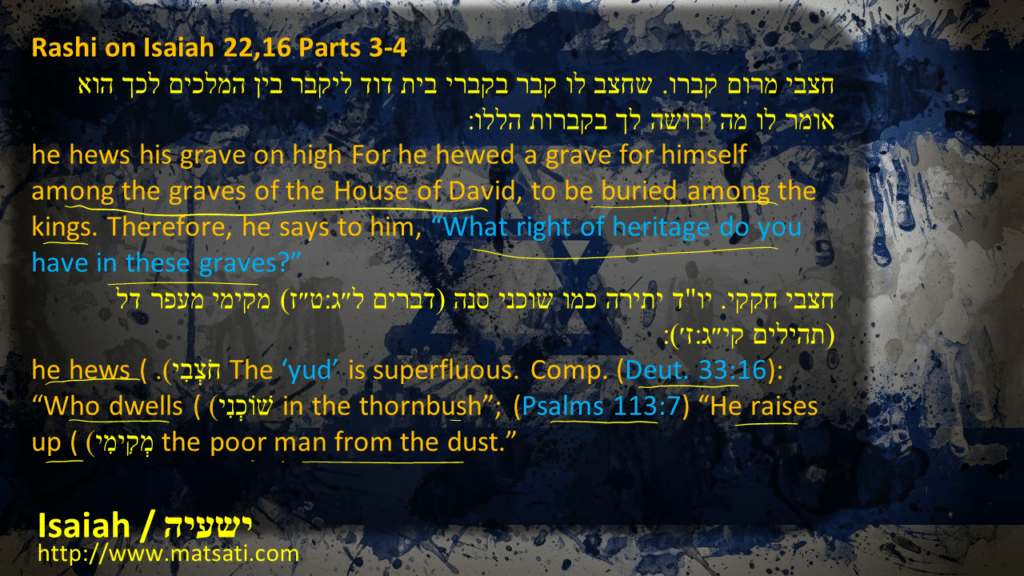
Rashi on Isaiah 22,16 Parts 3-4
חצבי מרום קברו. שחצב לו קבר בקברי בית דוד ליקבר בין המלכים לכך הוא אומר לו מה ירושה לך בקברות הללו:
he hews his grave on high For he hewed a grave for himself among the graves of the House of David, to be buried among the kings. Therefore, he says to him, “What right of heritage do you have in these graves?”
חצבי חקקי. יו”ד יתירה כמו שוכני סנה (דברים ל״ג:ט״ז) מקימי מעפר דל (תהילים קי״ג:ז׳):
he hews (חֹצְבִי). The ‘yud’ is superfluous. Comp. (Deut. 33:16): “Who dwells (שׁוֹכְנִי) in the thornbush”; (Psalms 113:7) “He raises up (מְקִימִי) the poor man from the dust.”
The idea here is Shebna’s pride caused him to build a tomb for himself in the midst of the tombs of the kings. It is interesting to note that the tombs of the kings were reserved only for righteous kings, and not for the evil kings. One of the major issues with pride is that this can make a person become condescending and self-righteous, so that one sees himself as greater than others, which then can lead to abusive behavior towards others. When we consider these things, pride can blind a person from the truth. In Isaiah’s day, the people and the leaders were filled with pride and became blind to the message of Isaiah. In the first Century period, Scribes, Pharisees, and Sadducees all in their pride failed to recognize Yeshua as the Messiah! This same thing occurs for the nations too. This is how Jeremiah speaks which parallels Isaiah 22:16 according to Jeremiah 49:16, spoken against Edom, “‘Your fierceness has deceived you, the pride of your heart, O you who dwell in the clefts of the rock, who hold the height of the hill!” The major take away from this study is that we are not to have a distorted view of who God is, and that we are to give the proper credit, reverence, and respect that is due to the Lord. Arrogance will continue to develop until we humble ourselves, otherwise we will suffer the consequences. The Scriptures teach us that the Lord God wants us to be living examples of His love towards others. This is why Yeshua said to walk in his footsteps (Matthew 16:24-25) and a major part of this is to put to death our pride. Note that pride is the single greatest obstacle to loving people, and so becomes a major roadblock to growing spiritually and walking in the footsteps of the Messiah and obeying God’s Torah!
